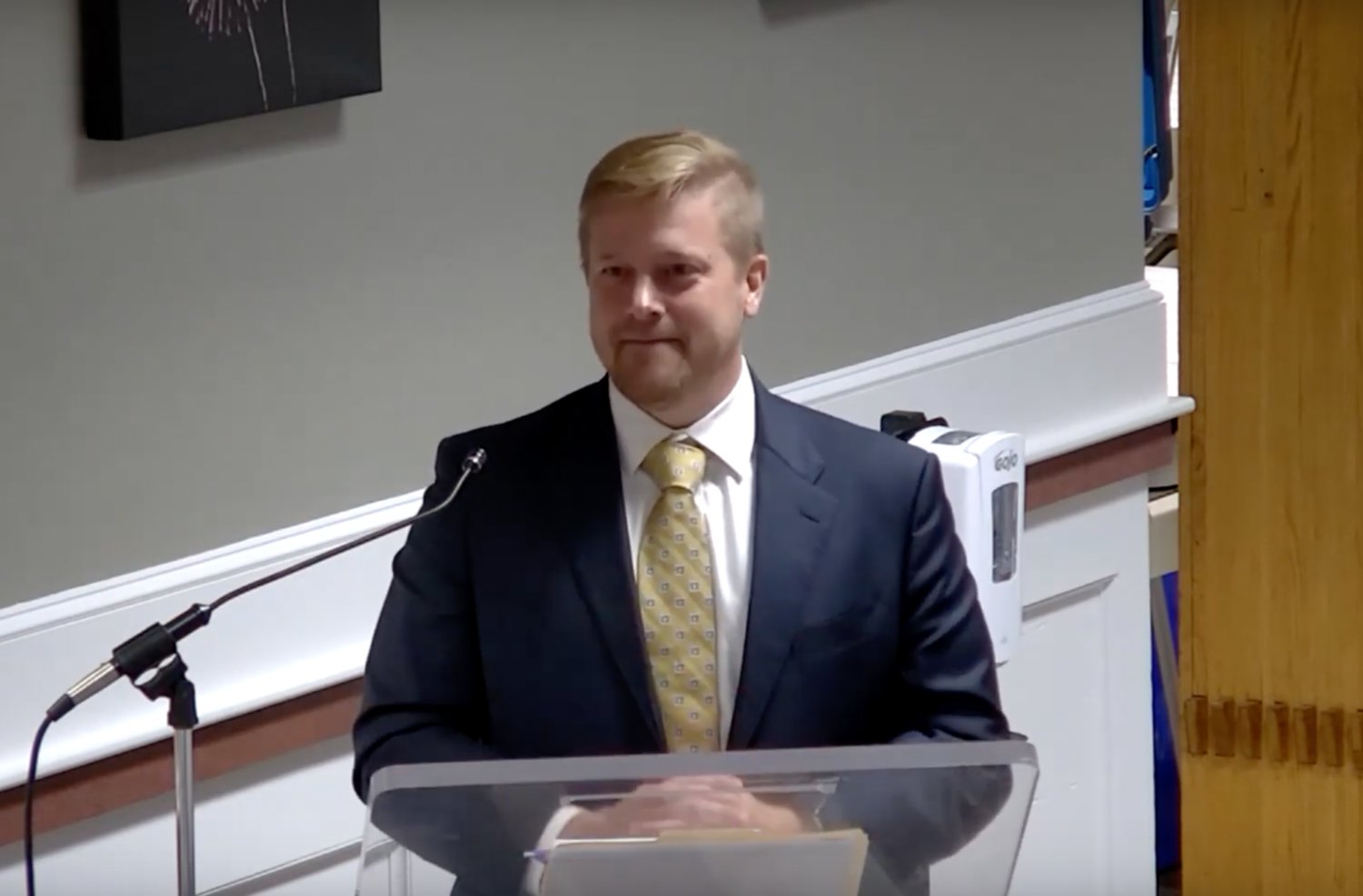Could electrical aggregation save Bristolians money?
The Town Council agreed to look into it
The Bristol Town Council agreed unanimously to look into the possibility of joining a consolidated energy program to decrease electrical bills for residents and boost the amount of renewable energy utilized for its electrical needs.
This item is available in full to subscribers.
Please log in to continue |
Register to post eventsIf you'd like to post an event to our calendar, you can create a free account by clicking here. Note that free accounts do not have access to our subscriber-only content. |
Day pass subscribers
Are you a day pass subscriber who needs to log in? Click here to continue.
Could electrical aggregation save Bristolians money?
The Town Council agreed to look into it
The Bristol Town Council agreed unanimously to send out a request for proposals (RFP) for companies that could potentially sign the town up for a consolidated energy program to decrease electrical bills for residents and boost the amount of renewable energy utilized for its electrical needs.
The constructive dialogue between the Town Council and Jamie Rhodes, representing Good Energy, occurred during the August 24 meeting and hearkened back to a prior presentation the town heard last summer.
Although the details of how energy aggregation programs work are complex, the gist of the sales pitch is that municipalities can join together to purchase electricity from third-party suppliers (think any company that’s not Rhode Island Energy, formerly National Grid), utilizing power in numbers to negotiate better rates.
The potential upside, aside from hopefully lowering residents’ monthly electrical bills, is that the energy coming from these deals would utilize a greater share of renewable sources, providing a moral incentive as well as a monetary one.
The presentation came to the Council after getting the unanimous approval of the town’s Conservation Commission in June.
“What this is about is hopefully reducing the cost for electricity to Bristolians,” said Commission Chairman Tony Morrettini in his introduction of the issue. “With all of us hearing about electricity going up 47 percent this winter, I think an opportunity to do that should be looked at. But more, the Conservation Commission is in favor of it almost as much because it increases the amount of renewable energy that we’ll all be consuming, which will cut down on climate change and help the environment.”
Savings can be as high as 30 percent (probably lower)
Seven other municipalities in Rhode Island have agreed to enter into energy aggregation programs with Good Energy — Barrington, Providence, Central Falls, Portsmouth, Newport, South Kingstown, and Narragansett. Middletown has taken an initial step but has not gone so far as to sign a deal. In Massachusetts, 53 cities and towns have gone forward with a contract.
In towns where a deal has been solidified and approved by the local and state regulating authorities, Good Energy contracts a third-party electricity supplier and negotiates a rate. As opposed to the deals a utility company like Rhode Island Energy will make, which include a “risk premium” based on how they try to time and anticipate the future cost of energy, Good Energy would created a more “flattened” rate schedule with less rapid fluctuations — which, as we are seeing now ahead of an anticipated rate spike of nearly 50 percent with Rhode Island Energy, could certainly have an upside.
“Every time we provide certainty within the market, we reduce overall costs,” Rhodes said. “As opposed to what we have now, where there is uncertainty in the market, and that’s where suppliers charge extra to compensate for that.”
When asked how much cities and towns can potentially save, Rhodes answered honestly that individual situations will vary. For instance, in some places in Massachusetts right now, municipalities who are part of the aggregation program as saving upwards of 30 percent compared to the traditional utility’s offering. But he admitted this was likely an outlier.
“To be clear, there’s a little bit of luck in that for me to say that,” he said. “Because when we locked in prices two years ago, I didn’t know there was going to be a pandemic and a war in Ukraine and prices jumping 300 percent, but that is what happened, and we had locked in those rates, and our communities are seeing the benefits of that over time.”
Rhodes said that a savings of around 5 percent was much more of a comfortable marker for communities who have joined such programs.
Council was wary of opting everyone in
Councilman Tony Teixeira responded to the presentation by saying he was uncomfortable with the idea of opting every resident in Bristol into such a program.
“If someone feels like they can get a better deal, they can certainly go out on the market and do that. But I am very concerned about that,” he said. “For us to negotiate something on behalf of our residents and put something in their lap.”
“We have never made a decision like this before to my knowledge for a resident,” agreed Council Chairman Nathan Calouro, who advocated that the matter should be sent out for an RFP.
Rhodes tried to answer those concerns by saying that residents will be made fully aware of the program through public notice and meetings, through direct mail, and through easily accessible information on a town-specific website for the program. He also said that residents can opt into and out of the program at any time, which becomes effective the following month. When asked, he said that in Massachusetts only about 15 percent of total customers in aggregation programs opt out.
“And that’s a sign that to me that we reached them,” Rhodes said. “It meant that that number of them saw this and said they should go choose something on their own.”
Further explaining, Rhodes said that residents would not see any noticeable changes in their electrical bill each month, which would still be paid to Rhode Island Energy. The only thing they would see different is the supplier of energy on the bill. Electrical bills are split up into two parts, he explained, the supply of electricity and the infrastructure and delivery of that electricity, which will always remain the domain of the local utility.
“We want to make it simple,” Rhodes said. “We want to break it down and not have to have somebody have a master’s degree in ratemaking to be able to understand it.”
Chief Lynch provides salient input
Bristol Police Chief Kevin Lynch, who served for a decade and rose to the title of Administrative Director with the Division of Public Utilities and Carriers — the sister agency to the Rhode Island Public Utilities Commission (PUC) — provided knowledgeable input about aggregation programs during the discussion.
“It’s a very complex issue. I can tell you that Mr. Rhodes and his company did yeoman’s work in front of the commission,” Lynch said, complimenting Good Energy for adapting how it assists ratepayers who get behind on payments.
Lynch pointed out that renewable energy is still much more expensive than fossil fuel energy at this point, and New England is still heavily reliant on fossil fuels. Lynch cautioned that it will be very difficult for third-party electricity suppliers to compete with utility companies like Rhode Island Energy due to how rates are negotiated and artificially adjusted through various federal and state subsidies.
“I think you would have to learn to see if there was savings for the other seven communities that are already out there in the pipeline, and there is potential to do that,” Lynch advised.
In the end, the Council unanimously agreed there was no cost or risk involved with sending an RFP to get project proposals from companies like Good Energy.
“Right now we’re dealing with all kinds of rising energy costs, we’re dealing with inflationary pressures that are really affecting everybody across the spectrum, we have residents living on fixed incomes, we have residents picking up extra shifts at the restaurant or the bar just to make ends meet,” said Aaron Ley. “I think what we ought to do here is do our due diligence and see what kind of rate we can get.”









